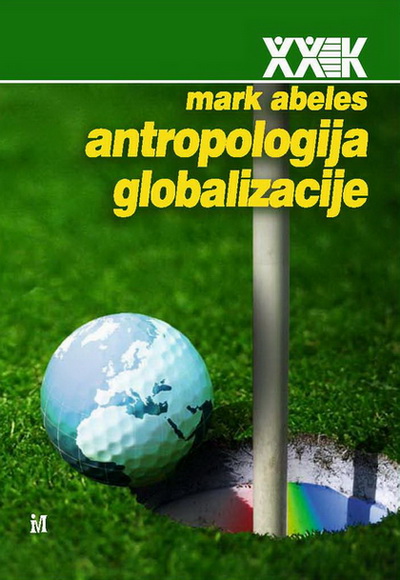ANTHROPOLOGY OF GLOBALISATION
Translated from French by Ana A. Jovanović
First edition: 2014
308 pages Price: 900 din.
Marc Abélès is a French ethnologist and political anthropologist. He completed his doctoral studies under the supervision of Claude Lévi–Strauss. From 1979 to 1995 he worked as research director in the Social Anthropology Laboratory in Paris, and in 1995 he founded the Laboratoire d’Anthropologie des Institutions et des Organisations Sociales (Laios), where he was director until 2010. Abélès is currently the director of the French-Argentine Centre in Buenos Aires. In 2001 Biblioteka XX Vek also published Abélès’s Athropology of the State, which was also translated by Ana A. Jovanović.
In the five chapters of this book („From economics to anthropology,“ „Anthropology confronts globalisation,“ „Political aspects of globalisation,“ „Violence in globalisation,“ and „Migration, civil rights and civil society“), Abélès offers an overview of themes that are concerns of contemporary critical anthropology and analyses problems that this current in anthropology faces. „One of the most striking forms of modernity is the way in which all of us constantly move between two fields, between the local and the global. This in a way justifies and enables the anthropology of globalisation; that is, it grasps the dialectic from within by establishing the fields in which a person’s preoccupation with things that are close and common are directly connected to the perception of belonging to a cultural world that spans the planet. If anthropology is not able to tell us anything extraordinary about mondialisation, it can at least shed light on globalisation as a multidimensional process where traditional points of reference are no longer valid, the network of relations between the individual and collective are reshaped, and across the globe, people’s ways of thinking and acting are profoundly transformed“ (from the Preface).
Preface
The words „mondialisation“ and „globalisation“ have become so rooted in everyday language that their use, in discussing emergent changes in contemporary societies, does not contribute to clarifying things but rather confuses them further. So it is best to take a cautious approach to those terms. We know that words are not innocent and that the inflation of some ideas is a representation of the spirit of an age: although sometimes they seriously reflect the central themes of an age, they are not the best material for deep analysis. Nonetheless it is clear that words cannot be avoided; every effort to get around them can prove, eventually, fatal for a proper understanding of things.
So let’s confront the question directly: we should immediately define the thing we propose to call „globalisation,“ a term which we prefer to „mondialisation,“ a term that is primarily used in Francophone areas. To justify this initial decision, we will answer immediately those who regard the French „mondialisation“ as a suitable equivalent to the English „globalisation.“ To their minds, the British and Americans chose this word because there is no other expression derived from the word world except one, and that is worldwide. Therefore they had to derive a new world from globe, which gave the adjective global, the verb to globalise and the noun globalisation. The meanings of these three derivatives match perfectly the French construction using the adjective mondial, the verb mondialiser and the noun mondialisation. According to that interpretation the difference is solely linguistic – the idea itself is the same in both cases.
However, if we look at the question more closely things become more complex. The people who speak of mondialisation stress that it is not a new phenomenon. Without hesitation they assert that the „first mondialisation“ should be regarded as the period between 1880 and 1914, when there was a strengthening of commercial exchange and an internationalisation of the economy. Some go further than that: for them, the idea of mondialisation applies even farther back in the past. The advocates of this position refer to Braudel and his idea of a world economy, so wonderfully applied in his analysis of the Mediterranean in the time of Philip II, when in the centres of human activity, cities like Venice, Milan, Genova and Florence, there existed many forms of interconnection and exchange.
It would be logical, however, to assume that we are now confronted with a much more radical transformation. The situation has permanently changed witht he creation of joint capital markets and the triumph of neoliberalism, both in postindustrial societies and in developing countries, which are compelled to undertake structural adjustment policies. The term „global“ seems perfectly suited to describe the level of integartion and interconnectedness that has been reached, and is reflected in the empirical observation of an individual that she belongs to a global world, regardless of her own cultural identity or territorial origin.
One of the most striking forms of modernity is the way in which all of us constantly move between two fields, between the local and the global. This in a way justifies and enables the anthropology of globalisation; that is, it grasps the dialectic from within by establishing the fields in which a person’s preoccupation with things that are close and common are directly connected to the perception of belonging to a cultural world that spans the planet. If anthropology is not able to tell us anything extraordinary about mondialisation, it can at least shed light on globalisation as a multidimensional process where traditional points of reference are no longer valid, the network of relations between the individual and collective are reshaped, and across the globe, people’s ways of thinking and acting are profoundly transformed.

